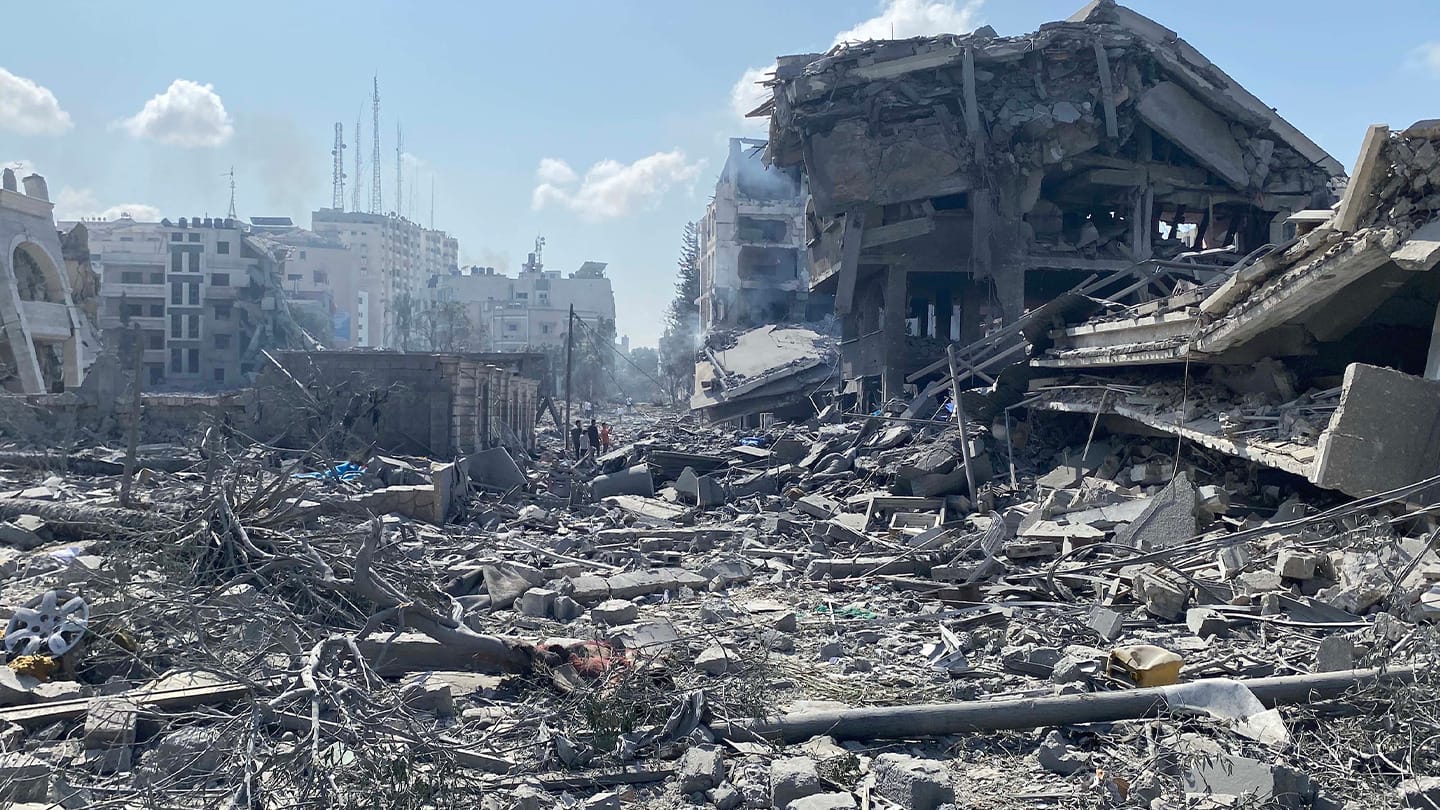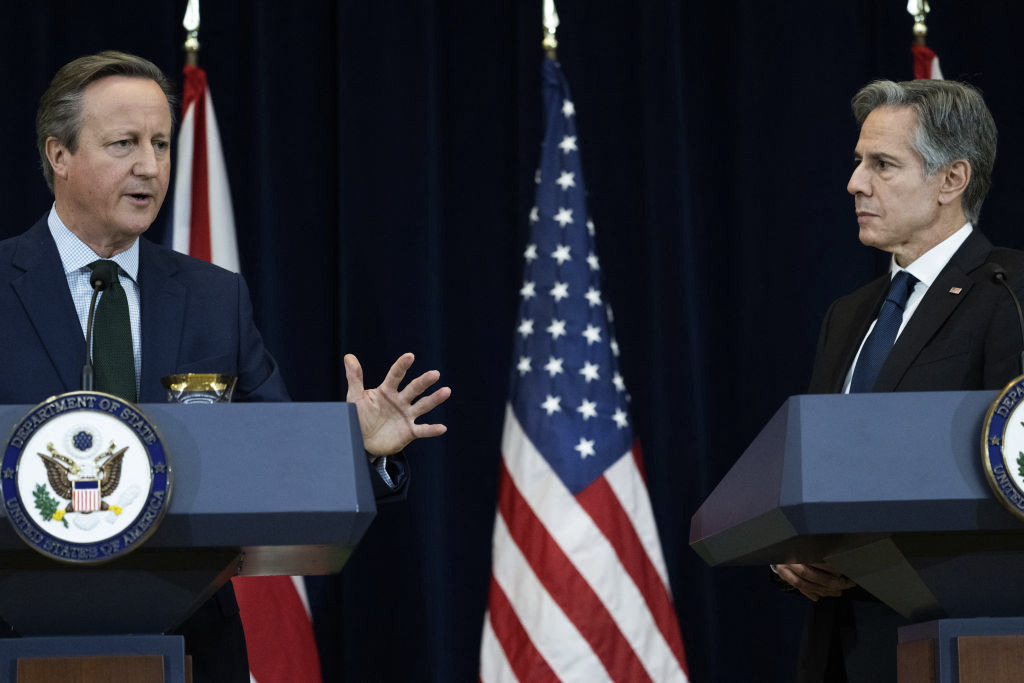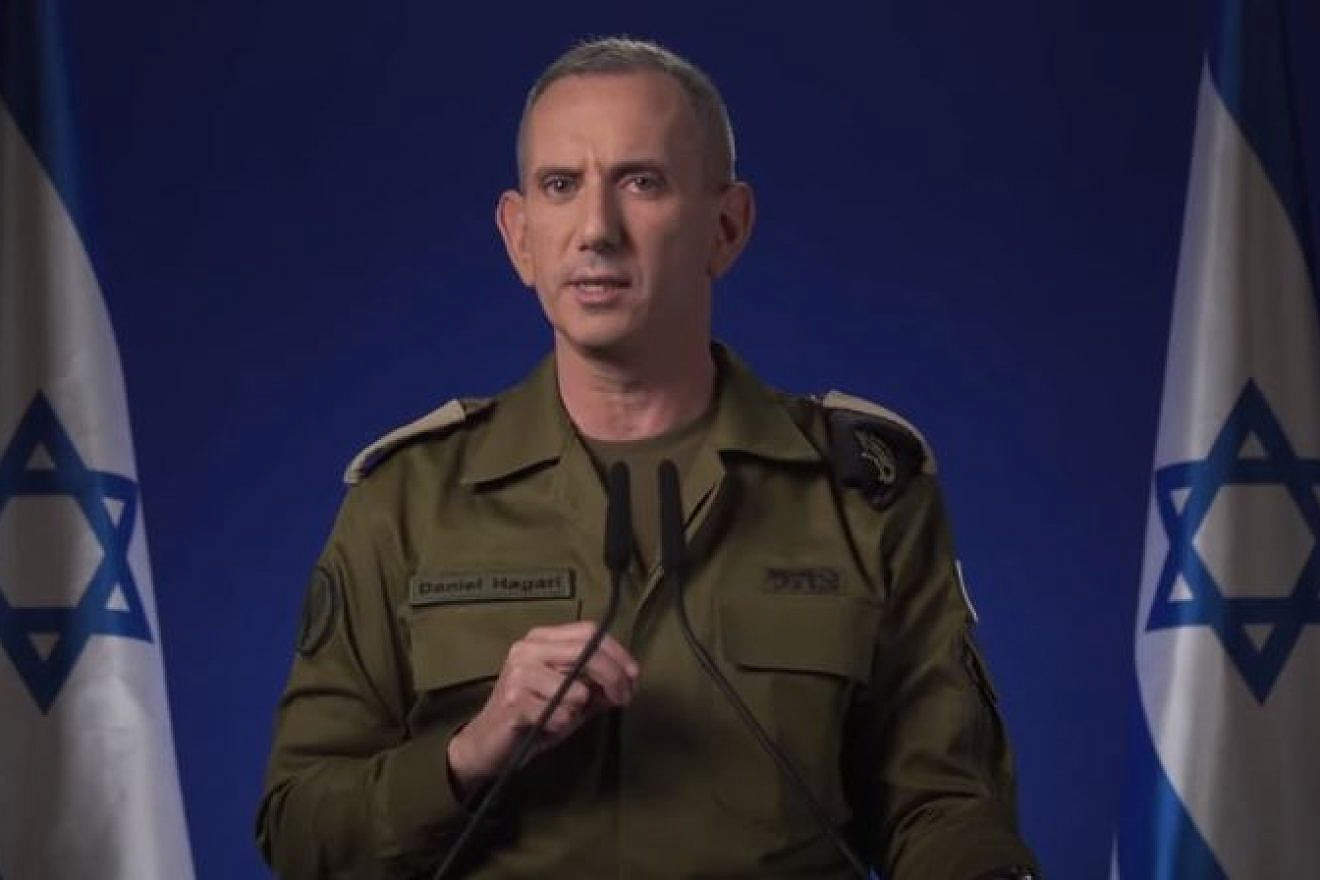 Zniszczenia po izraelskim nalocie na miasto Gaza. Fot. Palestinian News Information Agency
Zniszczenia po izraelskim nalocie na miasto Gaza. Fot. Palestinian News Information Agency
 Izrael przed Trybunałem: czy w Gazie trwa ludobójstwo?
Izrael przed Trybunałem: czy w Gazie trwa ludobójstwo?
Jagoda Grondecka
Międzynarodowy Trybunał Sprawiedliwości w Hadze orzeknie, czy Izrael dopuszcza się w Gazie ludobójstwa. Materiał dowodowy zawiera liczne wypowiedzi izraelskich polityków, którzy nie czynią rozróżnienia między bojownikami Hamasu a ludnością cywilną. Czy to wystarczy, by dowieść ludobójczego zamiaru? Pisze Jagoda Grondecka.
Wojna w Gazie nie trwała pełnych stu dni, gdy Izrael został oskarżony przez RPA o naruszenie przepisów Konwencji w sprawie zapobiegania i karania zbrodni ludobójstwa. Międzynarodowy Trybunał Sprawiedliwości, najwyższy organ sądowy ONZ, wysłuchał obu stron i, jak oczekują eksperci, w najbliższych tygodniach zdecyduje, czy wniosek jest zasadny.
Pierwsze przesłuchanie w Hadze odbyło się 11 stycznia. Zespół prawników reprezentujących RPA usiłował udowodnić, że Izrael dopuścił się zbrodni poprzez „popełnianie i niepowstrzymanie czynów ludobójczych”. Izrael zarzuty RPA stanowczo odrzuca. „Użycie terminu »ludobójstwo« w odniesieniu do uprawnionych ataków Izraela na Hamas, Islamski Dżihad i inne organizacje terrorystyczne w Gazie wypacza jego znaczenie. Izrael toczy wojnę z Hamasem, nie z mieszkańcami Gazy” – czytamy na stronie internetowej Izraelskich Sił Obrony.
Ministerstwo zdrowia w Strefie Gazy podaje, że w izraelskich atakach na Gazę życie straciło dotychczas ponad 23 tys. Palestyńczyków, w większości kobiet i dzieci. Większość spośród 2,2 mln mieszkańców Strefy została wewnętrznie przesiedlona. Organizacje humanitarne biją na alarm, że wielu z nich grożą choroby i głód.
Proces przed Trybunałem prawdopodobnie potrwa latami, lecz jeśli sędziowie uznają, że wniosek RPA jest wystarczająco prawdopodobny, mogą zdecydować o zastosowaniu środków tymczasowych. Strona oskarżająca wniosła o nakazanie Izraelowi zatrzymania wszelkich operacji wojskowych w Strefie Gazy. Zdaniem Izraela byłoby to pogwałcenie jego prawa do samoobrony.
Choć może wydawać się osobliwe, że wniosek do MTS złożyło państwo, które z Izraelem ani Palestyną nie graniczy, a wojna nie uderza w nie bezpośrednio, nie jest to pierwszy taki przypadek. W listopadzie 2019 roku Gambia zainicjowała przed Trybunałem wniosek przeciwko Mjanmie w sprawie zbrodni popełnianych na społeczności Rohingjów. Dwa miesiące później Trybunał orzekł, że zostały wypełnione przesłanki do zastosowania środków tymczasowych (choć innych niż te, których oczekiwała Gambia). Sędziowie uznali, że Mjanma nie wykazała, co zrobiła, by zapewnić Rohingjom bezpieczeństwo, i nakazał władzom powzięcie wszelkich środków będących w jej mocy, aby zapobiec czynom o charakterze ludobójczym i podżeganiu do takich czynów. Władze Mjanmy zostały również zobowiązane do składania okresowych raportów.
Co mówi prawo
W swoim wniosku prawnicy reprezentujący RPA cytowali Rafała Lemkina, polskiego Żyda, który w 1944 roku ukuł pojęcie ludobójstwa, by oddać ogrom niemieckich zbrodni. Lemkin, któremu udało uciec się do Stanów Zjednoczonych, spędził powojenne lata na lobbowaniu na rzecz przyjęcia konwencji dotyczącej ludobójstwa. Odniósł jedynie częściowe zwycięstwo. Choć w 1948 roku powstała Konwencja w sprawie zapobiegania i karania zbrodni ludobójstwa, Lemkin był przekonany, że tylko USA są wystarczająco potężne, by przekonać państwa świata do jej ratyfikacji. Jednak to właśnie same Stany Zjednoczone nie chciały o tym słyszeć, obawiając się, że przyjęcie takiego prawa otworzyłoby drogę do osądzenia ich samych za zbrodnie na rdzennych mieszkańcach Ameryki. Gdy umierał w 1959 roku, konwencja wciąż nie była ratyfikowana. Tak pozostało przez kolejne niemal trzy dekady, aż do decyzji administracji prezydenta Reagana w 1988 roku.
Jeszcze nigdy w historii nie zdarzyło się, by Międzynarodowy Trybunał orzekł, że jakiekolwiek państwo jest winne tej zbrodni. W 2007 roku uznał Serbię za winną temu, że nie zapobiegła ludobójstwu w Bośni i Srebrenicy, ale nie sam ludobójczy czyn; rozpoczęty w 2022 roku proces przeciwko Rosji wciąż trwa.
Zdaniem ekspertów wynika to z bardzo ścisłej definicji ludobójstwa zapisanej w prawie i wynikających z niej trudności w udowodnieniu go. Konwencja w sprawie zapobiegania i karania zbrodni ludobójstwa definiuje je jako „czyn dokonany w zamiarze zniszczenia w całości lub części grup narodowych, etnicznych, rasowych lub religijnych” i wymienia szereg aktów przemocy, które mogą kwalifikować się jako ludobójcze. Należą do nich: zabijanie członków grupy, powodowanie poważnego uszkodzenia ciała lub rozstroju zdrowia psychicznego członków grupy, rozmyślne tworzenie dla członków grupy warunków życia obliczonych na spowodowanie ich całkowitego lub częściowego wyniszczenia fizycznego, stosowanie środków, które mają na celu zahamowanie urodzin w obrębie grupy, a także odbieranie członkom grupy dzieci i przekazywanie ich innym osobom.
– „Ludobójstwo” jest słowem często używanym w różnych kontekstach – w debacie politycznej, by potępić przeciwników, przez decydentów zaangażowanych w zapobieganie okrucieństwom, przez badaczy nauk społecznych na określenie grupowej przemocy na dużą skalę, wreszcie – przez filozofów i teologów, by opisać wielkie zło – tłumaczy Ernesto Vardeja, dyrektor Instytutu Badań Nad Ludobójstwem Uniwersytetu Notre Dame. – Ta koncepcja ma jednak swoją konkretną definicję prawną, która nie pokrywa się w zupełności z innymi kontekstami, a pozew RPA będzie rozpatrywany właśnie w odniesieniu do tej prawnej definicji.
Zdaniem Menachema Rosensafta, prawnika z Uniwersytetu Columbia w Nowym Jorku, działania Izraela nie wypełniają znamion ludobójstwa. – Celem Izraela nie jest wyeliminowanie Palestyńczyków. Celem Izraela jest wyeliminowanie Hamasu, który stanowi egzystencjalne zagrożenie dla Izraela i jego populacji. Izrael prowadzi wojnę w obronie swojej populacji po barbarzyństwie, jakiego Hamas dopuścił się 7 października. Wszyscy, włącznie z premierem Netanjahu, rozumieją, że kiedy wojna się skończy, palestyńscy mieszkańcy Gazy wciąż będą mieszkać w Gazie. Celem nie jest więc ich eliminacja i przez to pojęcie ludobójstwa nie znajduje zastosowania – twierdzi i dodaje: – Uważam, że ten pozew został złożony przez RPA w złej wierze. Poza drobną wzmianką na wstępie o ataku Hamasu pozew całkowicie ignoruje fakt, że Hamas dokonał tego, nazywam to pogromem, przeciwko Izraelowi.
Dla definicji ludobójstwa poza słowami Konwencji istotne jest także dotychczasowe orzecznictwo sądów międzynarodowych: Międzynarodowego Trybunału Karnego, Międzynarodowego Trybunału Sprawiedliwości i tworzonych ad hoc trybunałów takich jak Międzynarodowy Trybunał Karny dla Rwandy, Jugosławii, Kosowa, Kambodży czy innych.
8 stycznia ONZ opublikowała raport, w którym stwierdza, że zbrodnie, których dopuścił się Hamas podczas ataku 7 października – w tym morderstwa, wzięcie zakładników i tortury, w tym seksualne, mogą zostać uznane za zbrodnie wojenne, a zważywszy na ich skalę – także za zbrodnie przeciwko ludzkości.
Ludobójstwo zaczyna się od intencji
W międzynarodowym prawie karnym nie istnieje żadna hierarchia zbrodni, ludobójstwo jest jednak trudniejsze do udowodnienia niż zbrodnie wojenne czy zbrodnie przeciwko ludzkości. Kluczowe dla przesądzenia o nim jest udowodnienie intencji sprawcy. Nie wystarczy po prostu wykazać, że dokonane czyny poskutkowały zbiorowym zniszczeniem. – Trzeba udowodnić, że sprawcy to zaplanowali. Zamiar i motyw są traktowane odrębnie. Sprawca może mieć różne motywy czy powody popełnienia ludobójstwa, takie jak wymierzenie kary, usunięcie zagrożenia dla własnego bezpieczeństwa, przejęcie ziemi itp. Jednak tym, co jest prawnie konieczne do udowodnienia ludobójstwa, jest zamiar, niezależnie od motywu – tłumaczy.
Złożony przez RPA pozew uwzględnia ten wymóg. Materiał dowodowy zawiera szereg cytatów izraelskich oficjeli i decydentów, w tym premiera Benjamina Netanjahu, które zdaniem prawników strony oskarżającej mają dowodzić ludobójczych zamiarów. „Szczególne ludobójcze zamiary Izraela są zakorzenione w przekonaniu, że w rzeczywistości »wróg« to nie tylko militarne skrzydło Hamasu, czy w ogóle Hamas, ale jest osadzony w strukturze życia Palestyńczyków w Gazie” – powiedziała reprezentująca RPA Tembeka Ngcukaitobi. Jej zdaniem izraelscy przywódcy „wprost wyrazili ludobójcze intencje w Gazie”. Chodzi między innymi o takie wypowiedzi, jak:
– Słowa prezydenta Izaaka Herzoga z 12 października 2023 roku: „Cały tamten naród jest odpowiedzialny. Retoryka o cywilach, którzy nie są świadomi ani zaangażowani, jest nieprawdziwa. To absolutna nieprawda. […] I będziemy walczyć, aż złamiemy ich kręgosłup”.
– Słowa ministra bezpieczeństwa narodowego Itamara Ben-Gwira z 10 listopada 2023 roku: „Żeby była jasność, gdy mówimy, że trzeba zniszczyć Hamas, mowa również o tych, którzy świętują, wspierają, rozdają cukierki – oni wszyscy są terrorystami i także powinni być zniszczeni”.
– Słowa ministra obrony Joawa Gallanta z 9 października 2023 roku, który zalecił „całkowite oblężenie Gazy”. „Żadnego prądu, żadnego jedzenia, żadnej wody, żadnego paliwa. Wszystko jest odcięte. Walczymy z ludzkimi zwierzętami i postępujemy adekwatnie”.
Obrona Izraela argumentowała, że wypowiedzi wysokich rangą izraelskich polityków i dowódców były stricte retoryczne i nie stanowiły decyzji politycznych.
Eksperci nie są zgodni co do tego, czy powyższe i inne, podobne w tonie wypowiedzi wystarczą, by sąd uznał, że działania Izraela w Gazie noszą znamiona ludobójczych zamiarów. – To naprawdę godne uwagi, jak bardzo język izraelskich przywódców nie czyni żadnego rozróżnienia między bojownikami Hamasu – a więc przeciwnikiem militarnym – a cywilami w Gazie. Wniosek RPA jest jedynie pierwszą salwą i bez wątpienia przedstawionych będzie o wiele więcej dowodów, ale już teraz jest bardzo silny i przekonujący – uważa Raz Segal, izraelski historyk z Uniwersytetu Stockton.
Innego zdania jest David Simon, dyrektor Programu Studiów Nad Ludobójstwem Uniwersytetu Yale. – RPA przedstawiła tak mocne argumenty, jak tylko mogła. Sprawa jest jednak mniej silna, niż mogłoby się wydawać na pierwszy rzut oka. Nie wystarczy przytoczyć okropne i oburzające cytaty. Będą musieli wykazać, że te cytaty rzeczywiście opisują politykę, która doprowadziła do opisanych wcześniej czynów. W niektórych przypadkach może istnieć taki związek – zależy to od polityki i poziomu przywództwa.
Yuval Shany, kierownik katedry prawa międzynarodowego publicznego na Uniwersytecie Hebrajskim w Tel Awiwie, także podkreśla, że zasadnicze znaczenie ma wykazanie bezpośredniego przełożenia wypowiedzi decydentów na wprowadzaną w życie politykę. – Nie wystarczy, że ktoś w Izraelu coś powiedział. Musi być udowodnione, że akcje izraelskich sił zbrojnych były kierowane tą wypowiedzią, że stanowiła ona instrukcję – tłumaczy.
Zdaniem Menachema Rosensafta „fakt, że niektórzy członkowie obecnego rządu są skrajnie prawicowymi ultranacjonalistami, ekstremistami, którzy poczynili bardzo obraźliwe stwierdzenia, nie czyni tego polityką rządu ani zamiarem armii”.
Prawnicy RPA przywołali także słowa premiera Netanjahu o Amalek, odnoszące się do biblijnej przypowieści o wrogim Izraelowi plemieniu, ostatecznym wrogu i całkowitym jego zniszczeniu. Według Ernesto Vardeji, odniesienie do Amalekitów jest „w każdym wymiarze ludobójcze”: – Biblijna historia o Amalek nie ma mnogości interpretacji. Istnieje tylko jedna. To historia całkowitego zniszczenia całej grupy, która jest widziana jako jedność. Język religijny jest bardzo ważny dla Izraela, nawet dla jego świeckich obywateli, bo odgrywa istotną rolę polityczną i kulturową – przekonuje badacz ludobójstwa.
Przed kim broni się Izrael?
Izrael odpierał zarzuty RPA, opierając się na prawie do samoobrony i przekonując, że odpowiedzialność za ofiary wśród ludności cywilnej spoczywa na Hamasie. Galit Raguan, p.o. dyrektorki wydziału sprawiedliwości międzynarodowej izraelskiego ministerstwa sprawiedliwości, powiedziała, że Hamas przechwytuje pomoc humanitarną i przekazuje swoim bojownikom.
W prezentacji przed Trybunałem przekonywała także, że Izrael przeszukuje szkoły, magazyny ONZ i szpitale, ponieważ przebywali w tych miejscach członkowie Hamasu i dodała, że Izrael ostrzega mieszkańców Gazy przed nadchodzącymi bombardowaniami, zrzucając ulotki i dzwoniąc do nich. „Nieuniknione ofiary śmiertelne i ludzkie cierpienie podczas każdego konfliktu nie są same w sobie wzorem postępowania, który wykazuje prawdopodobne zamiary samobójcze” – powiedział reprezentujący Izrael Christopher Stake.
– Musimy wziąć pod uwagę, dlaczego konkretne miejsce było bombardowane. Ataki na budynki cywilne bez dobrego powodu są wysoce problematyczne i powinny być ukarane. Z drugiej strony, jeśli mamy centrum dowodzenia Hamasu w tunelu, który jest celowo umieszczony pod szkołą czy obozem dla uchodźców, to komplikuje całą sprawę [prawo międzynarodowe dopuszcza wyłączenie szpitala spod ochrony, jeśli jest używany do prowadzenia operacji wojskowych; jednocześnie zabrania używania szpitala i jego pacjentów w charakterze tzw. ludzkich tarcz – przyp. aut]. Wtedy pojawia się pytanie o priorytet. Czy ważniejsze jest zdobyć pewność, że Hamas nie powróci, by dokonać kolejnego ataku i zabić 1500 cywili [ONZ podaje liczbę 1200 zabitych – przyp. aut.], gwałcić kobiety i brać zakładników? – uważa Menachem Rosenseft.
Eksperci przypominają jednak, że Izrael wielokrotnie atakował miejsca, które wcześniej wskazywał jako bezpieczne, przez co argument z „uczciwego ostrzeżenia” traci rację bytu. – Gazańczycy sami byli celem ataków, gdy chronili się w rzekomo bezpiecznych miejscach. Co więcej, duże połacie Gazy zostały zniszczone. Nie jestem pewien, jak Izrael może to wytłumaczyć, skoro na swoją obronę mówi: „podjęliśmy kroki, aby nie robić takich rzeczy”, ale i tak je robił – komentuje. Zdaniem Raza Segala izraelskie ostrzeżenia przypominają bardziej dokonywanie obławy niż polecenie ewakuacji. – Wiemy z relacji Palestyńczyków, że byli atakowani, gdy uciekali z północy na południe lub odwrotnie – przypomina.
– Izraelowi i Izraelczykom wydaje się, że walczą z barbarzyńcami. To jest wojna kolonialna. Historia prawa międzynarodowego pojawia się tam, gdzie ma ono zastosowane do wojen między „cywilizowanymi narodami”, czyli Europejczykami. Nigdy zaś nie miało znajdować zastosowania do wojen kolonialnych, w których „cywilizowane” narody walczyły z „dzikusami”. Widzimy wypowiedzi [izraelskich decydentów – przyp. aut.] o tym, że Gazańczycy że to „ludzkie zwierzęta”, potwory, dzikusy, naziści. A gdy walczymy z nazistami, prawo nie obowiązuje – uważa Raz Segal.
Cokolwiek postanowi Trybunał, zmiana już zachodzi
Trybunał powiedział, że ogłosi swoją decyzję niebawem, choć nie podał konkretnej daty. Większość ekspertów przewiduje, że wydarzy się to w ciągu kilku tygodni. Trudno przewidzieć, jak będzie brzmiało orzeczenie sądu. Może on postanowić o różnych rodzajach środków tymczasowych, jak nakazanie Izraelowi dopuszczania do Gazy większej ilości pomocy humanitarnej. Nie będzie to równoznaczne ze stwierdzeniem, że w Gazie dochodzi do ludobójstwa, ale zasygnalizowałoby powagę sytuacji i konieczność podjęcia kroków, by zapobiec jej pogorszeniu.
– Na tym wstępnym etapie chodzi o możliwość wystąpienia ludobójstwa, a nie ostateczny werdykt. Podejrzewam, że uznają [sędziowie – przyp. aut.] prawo Izraela do samoobrony, ale stwierdzą, że podejmowanie w tym celu środków potencjalnie ludobójczych nie jest ani konieczne, ani zgodne z prawem. Myślę również, że Izrael zostanie poproszony o samokontrolę i złożenie własnego raportu w kwestii tego, czy izraelscy politycy i urzędnicy państwowi swoimi podżegającymi wypowiedziami mogli nawoływać do ludobójstwa – przewiduje David Simon. – Nie jestem pewien, czy Trybunał uzna, że domniemane ludobójcze zamiary Izraela zostały udowodnione.
– Te środki mogą być albo bardzo ogólne, takie na przykład jak wezwanie Izraela do przestrzegania konwencji o ludobójstwie, albo bardziej konkretne, jak np. zapewnienie, że po wojnie wszyscy cywilni mieszkańcy wrócą do swoich domów – tłumaczy Yuval Shany. Problematyczne będzie przychylenie się do wniosku RPA o wezwanie Tel Awiwu do zawieszenia broni, jako że Trybunał nie może zażądać tego samego od Hamasu, bo jego jurysdykcji podlegają jedynie państwa, a nie aktorzy niepaństwowi. – Sąd raczej nie zdecyduje o nakazie wstrzymania wszelkich operacji wojskowych, bo byłoby to wbrew prawu Izraela do samoobrony – uważa. Menachem Rosensaft podkreśla, że „wezwanie do zawieszenia broni służyłoby tylko Hamasowi, który mógłby się w tym czasie przegrupować i zorganizować”.
Osobną kwestią pozostaje, co Izrael zrobi z orzeczeniem Trybunału. Choć taki wyrok jest prawnie wiążący i nie ma możliwości odwołania od niego, sąd ma ograniczone możliwości egzekwowania swoich postanowień. Może to zrobić Rada Bezpieczeństwa ONZ, lecz jej stali członkowie mają prawo weta. Jednym z najjaskrawszych przykładów tej niemocy społeczności międzynarodowej był przypadek Rosji, której w marcu 2022 roku Trybunał nakazał wstrzymanie inwazji na Ukrainę. Jak dobrze wiadomo – bez rezultatów.
– Pojawia się pytanie, czy Izrael zastosuje się do orzeczenia i czy jego sojusznicy będą na to naciskać. Podejrzewam, że w pewnym stopniu, ale nie w pełnym zakresie – prognozuje Simon. – Efekt wyroku sądu może być tylko symboliczny, lecz wobec nominalnej demokracji i zapewnień rządu Izraela o tym, że przestrzega prawa, wpływ orzeczenia Trybunału może być większy – uważa Segal.
– Jeśli Trybunał wyda rekomendację, by wyeliminować lub ograniczyć ludzkie cierpienie, musi ona być potraktowana poważnie. Jeśli taką, by dostarczać więcej pomocy humanitarnej, nie będzie to nowość. Wielu Izraelczyków jest tego samego zdania, prezydent Biden i sekretarz Blinke także do tego wzywali. Musimy poczekać i zobaczyć, co zdecyduje sąd i do jakiego stopnia uzna także, że Izrael ma nie tylko prawo, ale i obowiązek się bronić – mówi Menachem Rosnsaft.
Nie jest to jedyny proces, który toczy się w kwestii wojny w Gazie. 26 stycznia w sądzie federalnym w kalifornijskim Oakland odbędzie się przesłuchanie w sprawie wytoczonej przez Centrum Praw Konstytucyjnych przeciwko prezydentowi Joe Bidenowi i sekretarzowi stanu Anthony’emu Blinkenowi za „porażkę w zapobiegnięciu ludobójstwu i współudział w nim”. Grupa prawników z RPA zapowiada, że zamierza pozwać rządy USA i Wielkiej Brytanii za ich współudział w zbrodniach wojennych przeciwko Palestyńczykom.
Niektórzy uważają, że samo postawienie Izraela przed sądem oznacza koniec bezkarności, jaką ten kraj zawsze cieszył się w kwestii prawa międzynarodowego. Mówi Segal Raz: – Cokolwiek się teraz stanie, nawet jeśli sąd odrzuci sprawę, będzie bardzo ważne. Orzeczenie Trybunału będzie miało wpływ nie tylko na Izrael, ale także jego sojuszników. Pomyślmy, co widzimy już teraz. Związkowcy w Belgii odmówili zaangażowania w pracę związaną ze sprzedażą broni Izraelowi. Stany Zjednoczone były świadkiem największych protestów od czasów wojny w Wietnamie. Kanada oświadczyła, że zastosuje się do orzeczenia Trybunału. Widać, że kraje Zachodu zaczynają rewidować swoje dotychczasowe stanowisko.
Bardzo trudno przewidzieć, co się dalej wydarzy. Zapewne czekają nas zwroty akcji, ale nie ma już powrotu do świata sprzed 7 października. Jesteśmy już w procesie znaczących zmian.
Jagoda Grondecka – Iranistka, publicystka i komentatorka ds. bliskowschodnichDziennikarka, iranistka, komentatorka ds. bliskowschodnich. W 2020 roku została laureatką nagrody medialnej Pióro Nadziei.
Zawartość publikowanych artykułów i materiałów nie reprezentuje poglądów ani opinii Reunion’68,
ani też webmastera Blogu Reunion’68, chyba ze jest to wyraźnie zaznaczone.
Twoje uwagi, linki, własne artykuły lub wiadomości prześlij na adres:
webmaster@reunion68.com




 IDF Spokesperson Rear Adm. Daniel Hagari, March 3, 2024. Screenshot.
IDF Spokesperson Rear Adm. Daniel Hagari, March 3, 2024. Screenshot.